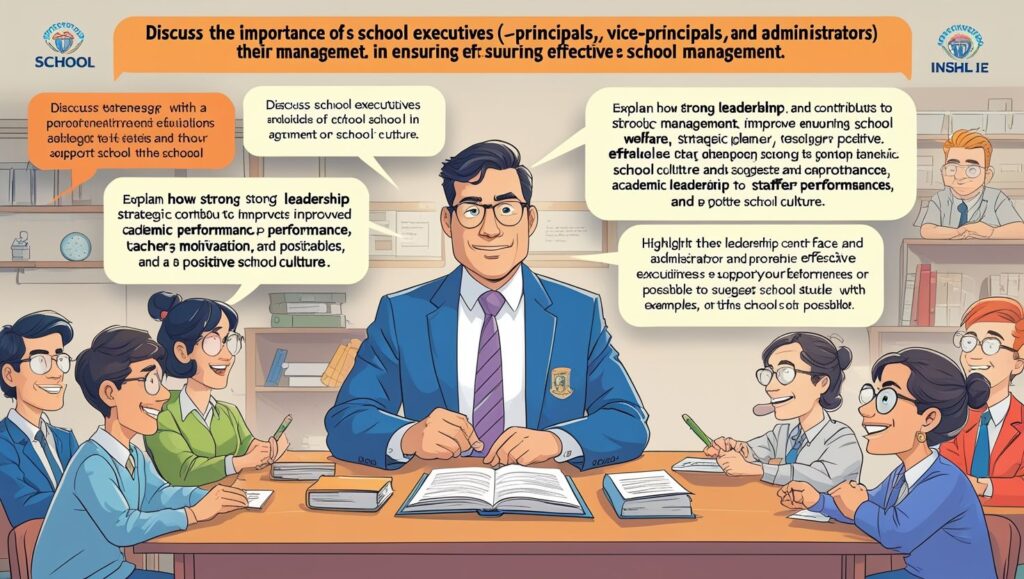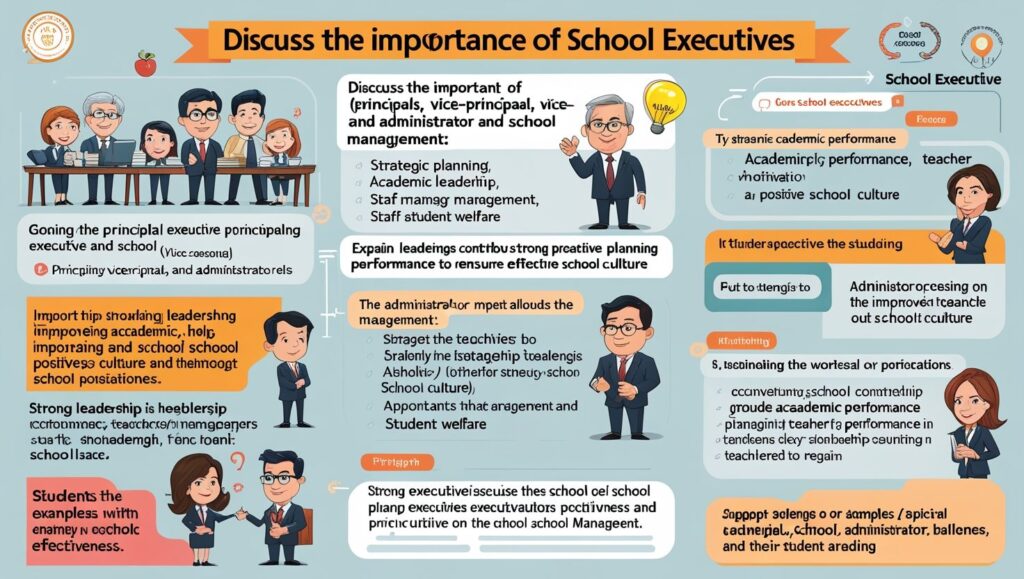Introduction
The Importance of School Executives for Effective School Management, Effective school management is crucial for ensuring a high-quality education system that fosters student success, teacher satisfaction, and community engagement. At the heart of this management are school executives—principals, vice-principals, deans, and other administrative leaders—who play a pivotal role in shaping the school’s vision, maintaining discipline, and driving academic excellence.
In today’s rapidly evolving educational landscape, school executives must navigate challenges such as technological advancements, diverse student needs, policy changes, and financial constraints. Their leadership directly impacts teacher performance, student achievement, and overall school culture. This article explores the key roles and responsibilities of school executives, their impact on school effectiveness, and the essential skills they need to lead successfully.
1. Key Roles and Responsibilities of School Executives
School executives are responsible for multiple aspects of school administration. Their duties extend beyond mere administrative tasks; they are visionaries, motivators, and problem-solvers. Some of their primary responsibilities include:
A. Strategic Planning and Vision Setting
School executives establish the school’s mission, vision, and long-term goals. They develop strategic plans to improve academic performance, infrastructure, and student well-being. By setting clear objectives, they ensure that all stakeholders—teachers, students, and parents—work toward common goals.
B. Academic Leadership and Curriculum Development
Effective school executives oversee curriculum design, ensuring it aligns with national standards and meets students’ needs. They collaborate with teachers to implement innovative teaching methods, integrate technology, and promote critical thinking. Their leadership ensures that the school remains competitive and up-to-date with educational trends.
C. Staff Management and Professional Development
School executives hire, train, and evaluate teachers and staff. They foster a positive work environment by providing professional development opportunities, mentorship programs, and constructive feedback. Strong leadership in this area enhances teacher morale and retention.
D. Student Discipline and Welfare
Maintaining discipline while ensuring student well-being is a critical responsibility. School executives implement policies that promote a safe and inclusive environment. They address behavioral issues, bullying, and mental health concerns, ensuring students feel supported.
E. Financial and Resource Management
Budgeting, resource allocation, and fundraising are essential tasks. School executives ensure that funds are used efficiently, facilities are well-maintained, and students have access to necessary learning materials.
F. Community and Parental Engagement
Building strong relationships with parents and the community is vital. School executives organize meetings, workshops, and events to keep parents informed and involved in their children’s education. They also collaborate with local organizations to enhance school programs.

2. Impact of School Executives on School Effectiveness
The Importance of Executives for Effective School Management, The effectiveness of a school largely depends on the competence of its executives. Research shows that strong leadership correlates with improved student outcomes, teacher satisfaction, and institutional reputation.
A. Enhancing Academic Performance
Studies indicate that schools with strong leadership consistently achieve higher academic results. Executives who prioritize data-driven decision-making, teacher support, and student-centered learning create an environment conducive to success.
B. Improving Teacher Motivation and Retention
Teachers thrive under supportive leadership. Executives who provide professional growth opportunities, recognize achievements, and maintain open communication reduce turnover rates and enhance teaching quality.
C. Fostering a Positive School Culture
A school’s culture influences student behavior and engagement. Executives who promote values such as respect, inclusivity, and excellence create a motivating atmosphere where students and staff feel valued.
D. Adapting to Technological and Educational Changes
With advancements in EdTech and evolving teaching methodologies, school executives must stay ahead of trends. Those who embrace digital learning tools, AI-based assessments, and personalized learning strategies keep their institutions competitive.
E. Ensuring Compliance with Policies and Regulations
School executives ensure adherence to government regulations, accreditation standards, and safety protocols. Their vigilance prevents legal issues and maintains the school’s credibility.
3. Essential Skills for Effective School Executives
To manage schools successfully, executives must possess a combination of leadership, interpersonal, and administrative skills.
A. Leadership and Decision-Making
Strong leaders inspire others, make informed decisions, and handle crises effectively. They must balance authority with empathy, ensuring fair and transparent governance.
B. Communication and Interpersonal Skills
Clear communication with teachers, students, parents, and policymakers is essential. Executives must be approachable, active listeners, and persuasive speakers.
C. Problem-Solving and Conflict Resolution
Disputes among staff, students, or parents require tactful resolution. Effective executives mediate conflicts, implement solutions, and prevent recurring issues.
D. Financial and Administrative Acumen
Budget management, resource allocation, and operational efficiency are critical. Executives must be proficient in financial planning and administrative processes.
E. Adaptability and Innovation
The education sector is constantly evolving. Successful executives embrace change, experiment with new teaching models, and leverage technology for better outcomes.

4. Challenges Faced by School Executives
Despite their crucial role, school executives encounter several challenges:
- Workload and Stress: Balancing administrative duties, teacher evaluations, and student needs can be overwhelming.
- Resistance to Change: Implementing new policies or technologies may face opposition from staff or parents.
- Budget Constraints: Limited funding affects infrastructure, teacher salaries, and student resources.
- Policy Changes: Frequent shifts in government regulations require constant adaptation.
- Student Behavioral Issues: Increasing mental health concerns and disciplinary problems demand proactive strategies.
5. Strategies for Strengthening School Leadership
To enhance the effectiveness of school executives, the following measures can be adopted:
- Ongoing Professional Development: Regular training programs on leadership, technology, and pedagogy keep executives updated.
- Mentorship Programs: Experienced leaders can guide new executives, sharing best practices.
- Collaborative Leadership Models: Encouraging shared decision-making among staff fosters inclusivity.
- Wellness Initiatives: Reducing burnout through stress management programs improves productivity.
- Community Partnerships: Engaging with businesses and NGOs can provide additional resources and support.
6. Case Studies: Successful School Leadership
Case Study 1: Finland’s School Leadership Model
Finland’s education system is renowned for its excellence, partly due to strong school leadership. Principals in Finland work closely with teachers, emphasizing autonomy and trust. Their focus on collaborative leadership has led to high student performance and teacher satisfaction.
Case Study 2: Singapore’s Principal Academy
Singapore invests heavily in training school leaders through its National Institute of Education. Principals undergo rigorous leadership programs, ensuring they are well-equipped to handle modern educational challenges.
7. Conclusion
The Importance of Executives for Effective School Management, School executives are the backbone of effective school management. Their leadership influences every aspect of education—from academic success to teacher morale and community trust. By developing strong leadership skills, embracing innovation, and fostering collaboration, school executives can create thriving learning environments that prepare students for future challenges.
Investing in their professional growth, providing adequate resources, and recognizing their contributions will ensure that schools remain centers of excellence. As education continues to evolve, the role of school executives will only grow in importance, making their effective leadership indispensable for the future of learning.

9 thoughts on “The Importance of Executives for Effective School Management”
Comments are closed.